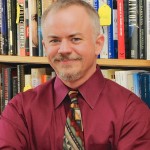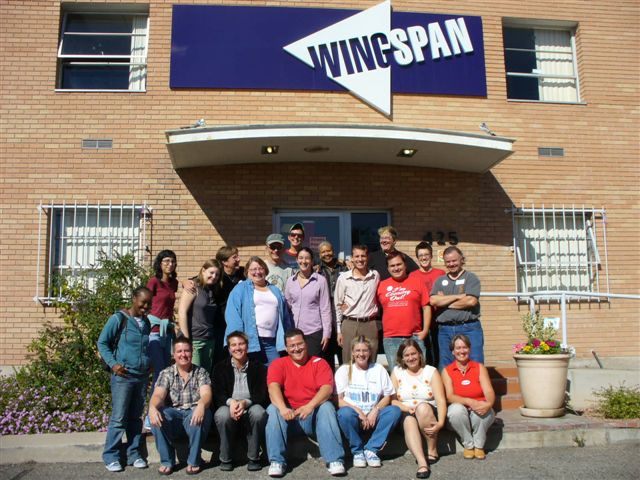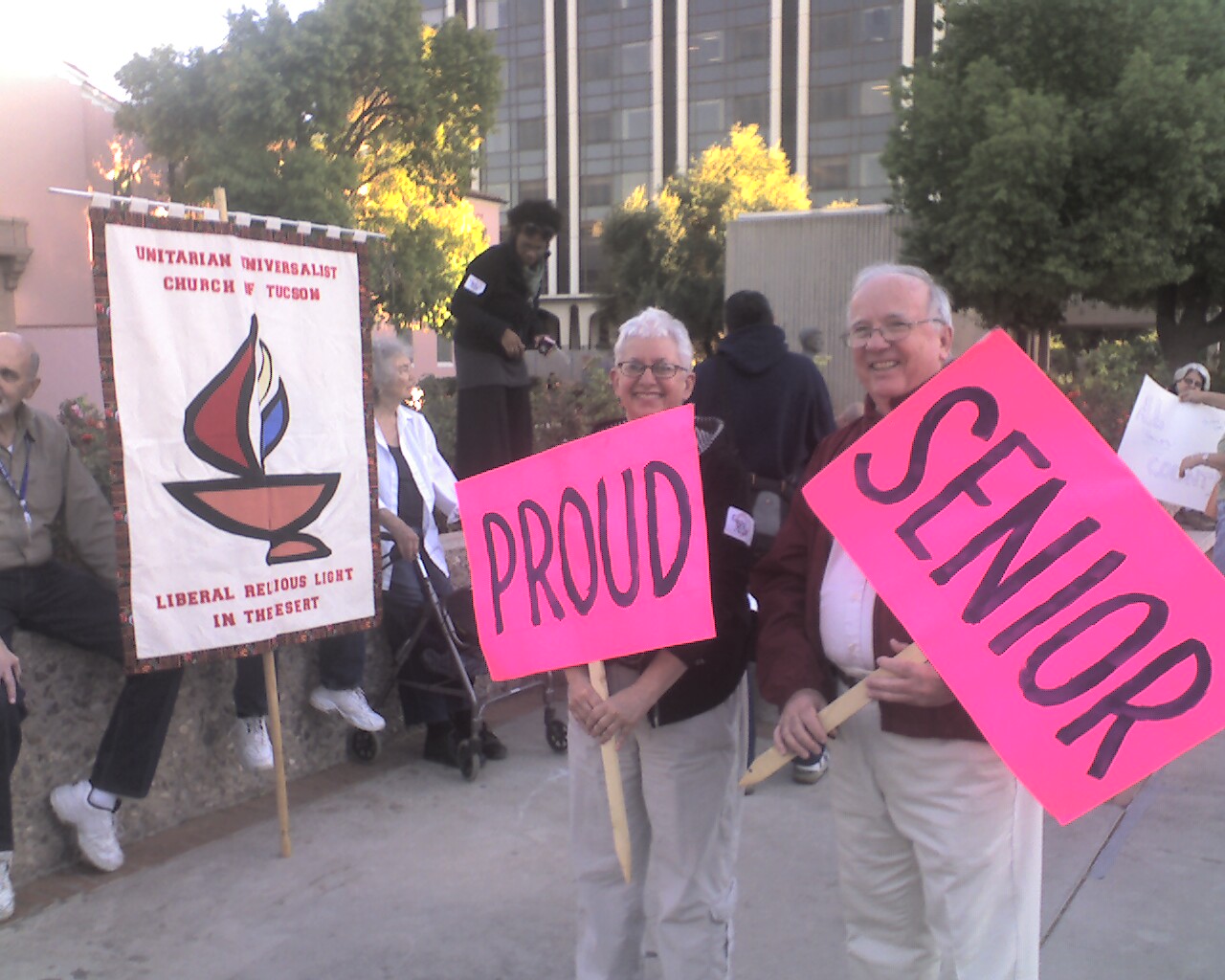 C. Michael Woodward, MPH, is a writer and LGBTQ inclusion consultant and trainer based in Tucson, Arizona. He worked in various roles on the staffs of SAGA, Wingspan, and SAAF and now serves on the Board of Directors of SAGA and Equality Arizona. He wrote the title essay for the anthology Manning Up: Transsexual Men on Finding Brotherhood, Family & Themselves (Transgress Press, 2014).
C. Michael Woodward, MPH, is a writer and LGBTQ inclusion consultant and trainer based in Tucson, Arizona. He worked in various roles on the staffs of SAGA, Wingspan, and SAAF and now serves on the Board of Directors of SAGA and Equality Arizona. He wrote the title essay for the anthology Manning Up: Transsexual Men on Finding Brotherhood, Family & Themselves (Transgress Press, 2014).
July 31, 2014 was the end of an era, and a sign of the times. After 27 years in business, Tucson’s once mighty LGBT community center, Wingspan, closed its doors.
In its heyday, Wingspan was the largest LGBT center per capita in the country. Given the size of Tucson metro area with a population of just over 1 million, it was quite remarkable that the center had 22 full time staff and a bigger budget than some of the centers in cities twice our size. The Tucson LGBTQ community was fiercely proud of Wingspan. Many community members felt a literal sense of ownership: the initial years of work to establish the center was done exclusively by volunteers who donated their time, talent, and resources to make it happen.
Wingspan started in 1988 as a youth group that met in the homes of various volunteers until enough funding was raised to open a drop-in center on 4th Avenue, the main artery of the city’s gayborhood. In 2001, the first executive director, Kent Burbank, was hired. The organization began to grow rapidly, taking advantage of many foundation grants and government funding opportunities as well as generous donations from the community.
Over time, the center developed a number of innovative programs including the Wingspan Anti-Violence Project, which featured a 24-hour crisis line; the Eon drop-in center for LGBTQ youth; Rainbow Families for LGBT folks with kids; and a Health & Wellness program featuring tobacco cessation, breast cancer awareness programs, and more.

In 2005, Wingspan merged with the Southern Arizona Gender Alliance (SAGA), a grassroots transgender support and advocacy organization, and SAGA became a program of Wingspan. This made Wingspan one of the first LGBT community centers to have staff dedicated to transgender outreach and advocacy beyond mental health and HIV services. At one point in the late 00s, when other self-identified “LGBT” community centers were still trying to figure out how the “T” fit into their existing mostly G/L programs, nearly 25% of the Wingspan’s staff identified as transgender or non-binary.
Yet another successful program on the menu was Wingspan Senior Pride, which focused on LGBTQ folks 55 and older. Senior Pride offered a monthly newsletter and social activities to help reduce the isolation many LGBTQ elders face. Penelope Starr, one of the program coordinators, also developed a popular recurring event called “A Colorful Life”, which highlighted notable elders in the local LGBTQ community. Senior Pride also offered a cultural competency training for health care providers known as the “Rainbow Train”. Rainbow Train even recorded a training video featuring and made by the program volunteers and staff.
By 2007, Wingspan was a thriving community space that was supported and respected by city leadership as well as the media, and many saw it as a national model of excellence.
But then something happened. Actually, several somethings happened.
It started with the departure of Kent Burbank, the center’s beloved executive director. It was a completely amicable parting, but it forever changed Wingspan. After more than two years of interim directors and a new ED who stayed only a few weeks before suddenly resigning and leaving town, University of Arizona alumnus Jason Cianciotto returned from New York City to take the helm of the same organization that helped him find support and acceptance as a gay teenager growing up in Tucson.
Jason was a talented guy, but just as he was starting to patch some of the holes in the ship, Wingspan was hit by the same tsunami that took down hundreds of organizations across the country—namely, the financial crash of the late 2000s. After being forced to slash some entire programs from the center’s services, Jason eventually stepped down himself in an effort to retain more program staff and keep the doors open.
One way or another, Wingspan hung in there for a few more years with a handful of staff, but the Board of Directors eventually had to concede to the financial realities of the situation. Gentrification of the 4th Avenue area meant renewing the lease with an obscenely large rent increase, which sadly coincided with the loss of yet another long-time funding source. The Board of Directors voted to relieve Executive Director Carol Grimsby of her duties. A few weeks later, the center quietly went dark at the end of a long, hot Arizona summer day last July.
But that’s far from where the story ends! While the physical space was gone, a few of Wingspan’s programs were still functioning with either a single staff person or a strong core of volunteers. Despite some concerns about the general public’s conflation of LGBT and HIV issues, the Board agreed to move the Eon youth project and the Anti-Violence Project to the Southern Arizona AIDS Foundation (SAAF). Each of the other Wingspan programs essentially had four options: be adopted as a full program of SAAF, find a new non-profit to serve as the fiscal sponsor, make a go of it as an independent organization, or fold.
SAGA opted to incorporate and become the state’s only 501(c)(3) non-profit focused directly on transgender support and advocacy. Puertas Abiertas (the Latino/Latina Pride group) and Rainbow Families went grassroots. The Multi-Faith Working Group (of welcoming congregations), SAGA’s Camp Born This Way (for trans kids), and Senior Pride all took SAAF as their new sponsor. Everyone crossed their fingers and held their breath waiting to see what happened next.

Fast forward one year, and I’m happy to report that every program from the Wingspan family remains alive and well today, doing what they do best with whatever resources they can muster.
- Politics be what they may, SAAF has somehow magically found the capacity to support and stabilize both of the programs it adopted–a year later, each is thriving under significant new funding sources and continues to serve our communities’ most vulnerable.
- After a very successful start-up funding drive, SAGA is preparing to hire two part-time project coordinators to manage its very ambitious agenda that includes economic empowerment projects for trans people like a job fair and training in public speaking and to manage and expand its support and social groups and activities.
- Camp Born This Way tripled the number of families attending over last year. Puertas Abiertas has sponsored a number of films and social events, Rainbow Families continues to meet and network LGBTQ families with their peers, and the Multi-Faith Working Group is planning a film and discussion series along with its annual Pride service.
- The newly renamed, all-volunteer Southern Arizona Senior Pride (SASP) continues to publish its monthly newsletter and has stepped up its outreach to other community organizations as well. The Rainbow Train sensitivity training was absorbed by Project Visibility at the Pima Council on Aging (PCOA). An ad hoc committee has been busy planning a major special event to be held next winter.*
Tucson’s LGBT community is not one of wealth, but is certainly one of commitment to taking care of its own. Not surprisingly, several community members recently agreed to host a community town hall to discuss the future of the Tucson LGBT community post-Wingspan. It’s tentatively scheduled for late October, and will be hosted by out lesbian City Council Member and current Vice Mayor Karin Uhlich.
Is there a new community center in Tucson’s future? Who will support it and who will use it? Will the now separate groups come back together if there is? The answers to these and other questions remain to be seen, but one thing is for sure: Tucson is still one of the friendliest cities in the southwest for LGBT people to live. The protective city policies and leadership, the amazing Arizona scenery and weather, the left-of-center political environment, and the relatively low cost of living compared to larger urban areas makes Tucson a very popular place for LGBT people of all ages.
*The SASP Community Forum will feature the movie ”Reel in the Closet” and director Q&A, as well as other speakers and a vendor and resource fair on Sunday, Feb. 7, 2016, 1:00-5:00pm at the Tucson Jewish Community Center.
The opinions expressed in this article are those of the author and do not necessarily reflect those of the Diverse Elders Coalition.

